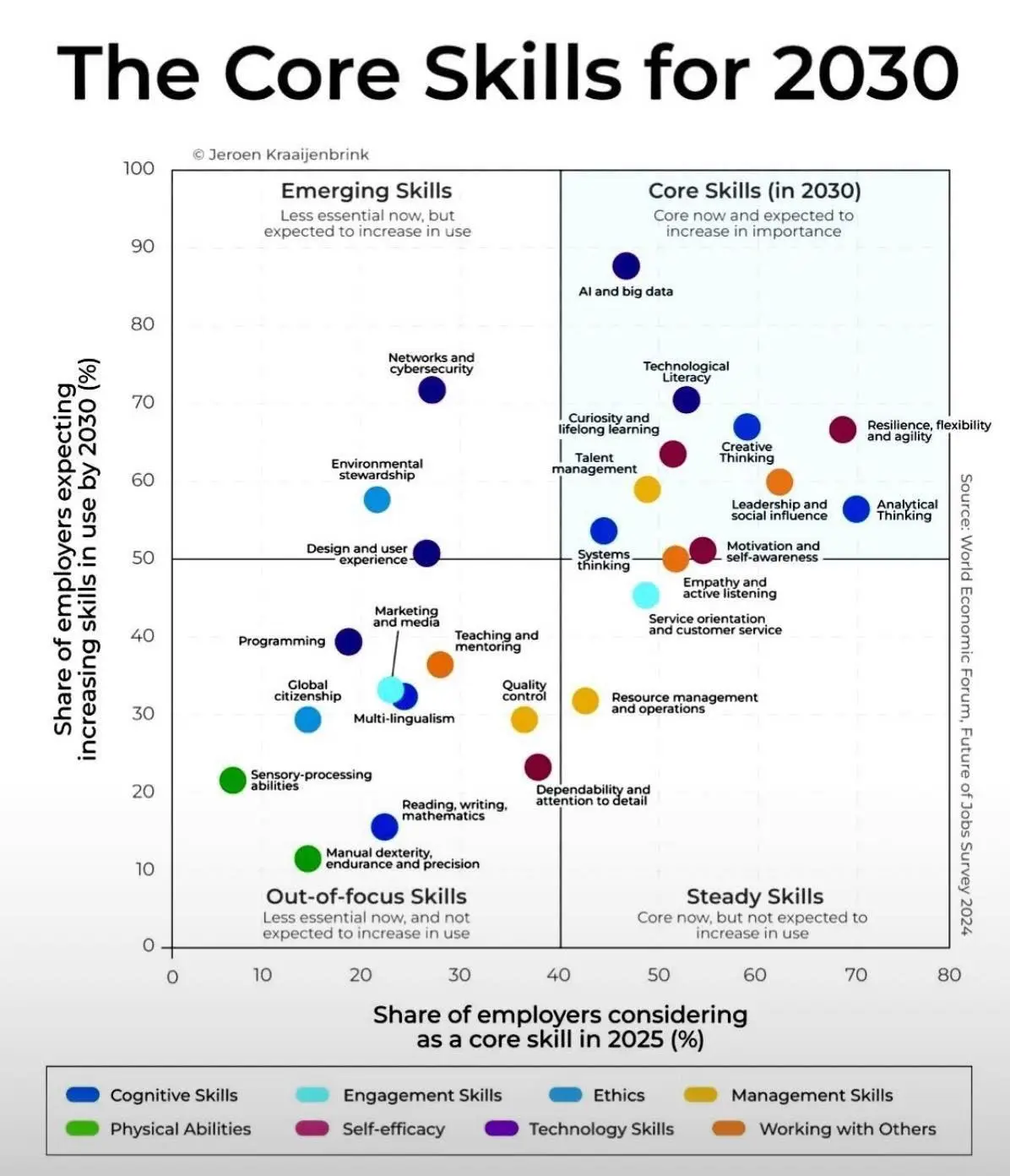This Chart Might Keep You Up: The Future-Proof (and Doomed) Skills Revealed by 2030
It’s not just a career trend chart. It’s a blueprint for future-proofing your personal skill portfolio.
The “Core Skills for 2030” chart, published by the World Economic Forum, has been going viral among professionals. At first glance, it looks like a workplace trend forecast — but look closer, and it’s more like a skills-based investment guide.
It shows which abilities will grow in value and which are already on the decline. Think of it as your ETF map for human capital.
🔍 How to Read This Chart
The chart categorizes skills using two axes:
- X-axis: Share of employers who consider it a core skill by 2025
- Y-axis: Projected increase in use by 2030
The result? Four strategic zones:
- Top Right: Core Skills (High Now, Higher Later)
- Top Left: Emerging Skills (Low Now, Rising Fast)
- Bottom Right: Steady Skills (Important but Plateauing)
- Bottom Left: Out-of-Focus Skills (Declining Relevance)
🧠 5 Major Insights: It’s Not What You Know — It’s What You Can Recombine
① AI & Data Skills Are Must-Haves — But Programming Is Losing Steam
- ✅ AI and Big Data, Technological Literacy → Top right, rising in value
- ❌ Programming → Bottom left, declining in relevance
🔑 Takeaway: The future isn’t about learning to code. It’s about learning how to leverage AI strategically to solve problems and design systems.
② Self-Efficacy and Leadership Are the New Professional Currency
- Resilience, Flexibility, Agility
- Leadership and Social Influence
These are the uniquely human traits that machines can’t replicate. They’re now seen as brand assets in the workplace.
🔑 Takeaway: Your reputation and influence are starting to matter more than your technical skills.
③ Systems Thinking + Lifelong Learning = Exponential ROI
- Systems Thinking
- Curiosity and Lifelong Learning
Success belongs to people who can connect the dots, not just master individual skills. Future learning is about building interoperable, scalable knowledge.
🔑 Takeaway: Learn to assemble your skills like puzzle pieces — not collect them like trophies.
④ Underrated Yet Rising: Cybersecurity, UX, Sustainability
- Networks and Cybersecurity
- Design and User Experience
- Environmental Stewardship
These are low-visibility now but projected to skyrocket. Call them undervalued growth stocks in your career ETF.
🔑 Takeaway: Digital risk, human-centered design, and ESG literacy are becoming foundational to competitive advantage.
⑤ Empathy & Customer Service: Still Required, No Longer Differentiators
- Empathy and Active Listening
- Customer Service Orientation
These are stable skills. Doing them poorly is a liability. Excelling at them? No longer a career booster.
🔑 Takeaway: Kindness is expected — but strategic execution is what moves the needle now.
📌 Practical Application: A Strategic Guide for Teams and Talent
| Use Case | Strategic Recommendation |
|---|---|
| Internal Training | Prioritize top-right skills + enhance flexibility and integrative thinking |
| Hiring Strategy | Recruit for learning agility, not just technical mastery |
| Education Design | Focus on cross-context application, not single-point expertise |
| Personal Branding | Build an influential, AI-augmented identity that’s irreplaceable |
🧭 Final Thought: Skills Are Assets — Invest Like It
This chart isn’t just about trends. It’s a signal to restructure your skill portfolio with future returns in mind.
You don’t need to be great at everything — but you must learn, combine, and pivot fast.
In the future, the true power skill isn’t knowledge. It’s transformation.

